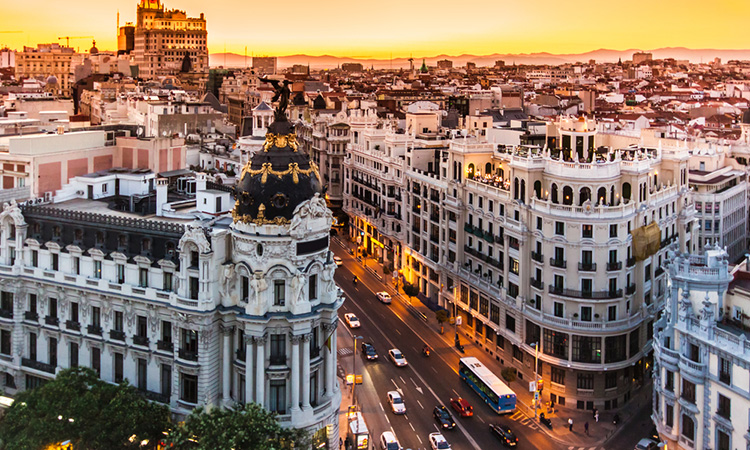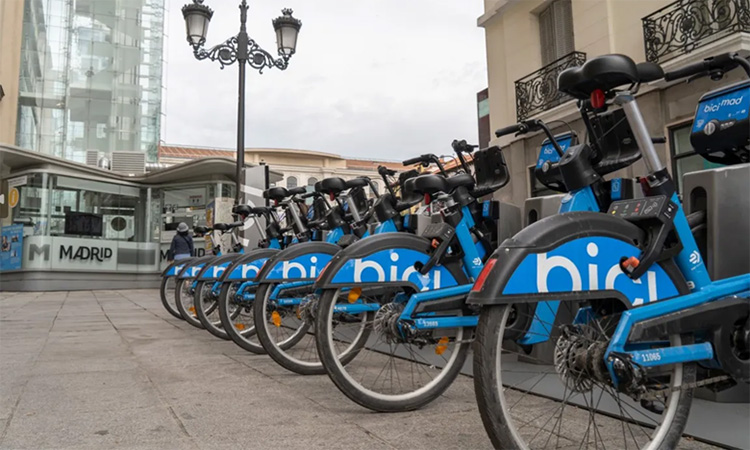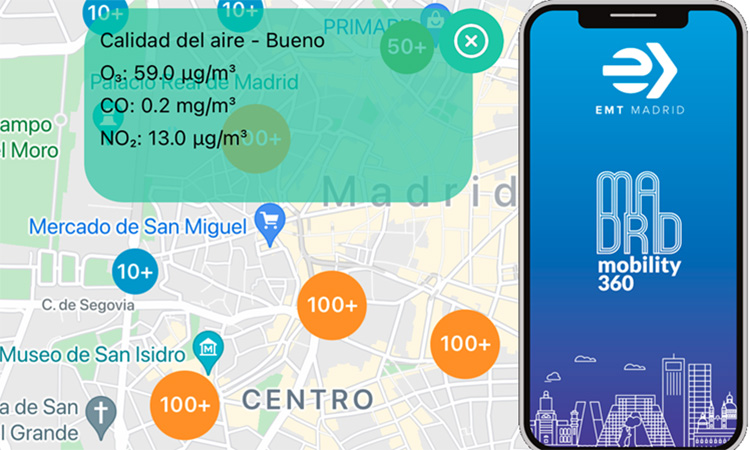From gas to green: Madrid’s progressive urban transportation shift
- Like
- Digg
- Del
- Tumblr
- VKontakte
- Buffer
- Love This
- Odnoklassniki
- Meneame
- Blogger
- Amazon
- Yahoo Mail
- Gmail
- AOL
- Newsvine
- HackerNews
- Evernote
- MySpace
- Mail.ru
- Viadeo
- Line
- Comments
- Yummly
- SMS
- Viber
- Telegram
- Subscribe
- Skype
- Facebook Messenger
- Kakao
- LiveJournal
- Yammer
- Edgar
- Fintel
- Mix
- Instapaper
- Copy Link
Posted: 25 January 2024 | Lola Ortiz Sanchez - City of Madrid | No comments yet
Whilst at Transport Innovation Summit 2023, Intelligent Transport’s Halimah Haque sat down with Dolores Ortiz Sanchez, Director General of Mobility at Madrid City Council, to discuss Madrid’s transformative approach to sustainable urban mobility, covering topics from electrifying the city’s bus fleet to integrated smart mobility systems and future transportation projects.


How has Madrid’s public transportation system evolved in recent years?
In recent years, we have been diligently working towards the electrification of our bus fleet. Given the current count of over 2,000 buses operating within the city, the complete electrification of our entire fleet stands as a top priority. This commitment aligns with our goal of fostering a cleaner and healthier urban environment by ensuring the adoption of electric buses for sustainable and eco-friendly public transportation.
What are some of the key challenges that Madrid faces in reducing emissions from private vehicles?
In 2025, residents and city visitors will be prohibited from driving high-pollution vehicles”
We are implementing robust measures to mitigate pollution in our city, primarily stemming from private vehicles. We have instituted a ultra-low emission zone in the city’s central area (ultra-low emission zone of special protection in the Central District). By 2024, this low-emission zone is encompassing all municipalities, targeting individuals residing outside of the city. Subsequently, in 2025, residents and city visitors will be prohibited from driving high-pollution vehicles, further reinforcing our commitment to a cleaner urban environment.
What initiatives are currently in place to encourage modal shift within the city?
We are actively promoting the transition to public transportation, discouraging the use of private vehicles”
We are actively promoting the transition to public transportation, discouraging the use of private vehicles. To this end, we have implemented complimentary travel days for buses. These initiatives are strategically designed to motivate individuals to opt for public transport, whether it’s their first time or to reinforce the myriad benefits it offers. The success of these designated days is evident in our record-high bus occupancy rates, showcasing a positive response to our new fleet of electric buses. These environmentally friendly vehicles not only contribute to a pollution-free environment, but also reduce traffic congestion.
I am delighted to report that our current bus occupancy rates surpass those observed prior to the pandemic.
Concurrently, we are reducing the number of available parking spaces, advocating for various intermodal transportation modes in the city, including scooters, car-sharing, motor-sharing and, of course, cycling. In addition, we are expanding BiciMad, Madrid’s public cycle-sharing system, within all districts of the city.


Credit: BiciMad
How does Madrid plan to improve infrastructure for public transport and active travel to enhance sustainable mobility options and reduce congestion?
In Madrid, walking is a prevalent mode of travel, constituting a significant portion of the nearly 13 million daily trips in our city”
We are establishing new municipal bus lines, along with a new bus rapid transit line (BRT), aimed at prioritising buses in traffic flow. Additionally, we are creating new cycling lanes across the city to encourage bicycles as a means of active transportation.
In Madrid, walking is a prevalent mode of travel, constituting a significant portion of the nearly 13 million daily trips in our city; in fact, four million of these journeys are made on foot. Consequently, we are pedestrianising more areas in all districts of the city to enhance public spaces for pedestrians.
How has Madrid embraced electric and sustainable mobility options such as electric buses and shared electric scooters to reduce emissions and promote cleaner transportation?
As mentioned earlier, we are making substantial investments in new electric buses. Furthermore, we are committed to expanding the network of charging points throughout the capital. At the heart of Madrid, we have established an innovative electric mobility hub named Canalejas 360 (Canalejas Mobility Hub).
This hub features a high-tech, ultra-fast electric charging point, the most powerful station of its kind in Spain. It is accessible to vehicles operated by electric shared mobility services, as well as private vehicles. The hub also accommodates car-sharing and motor-sharing services, designated cycling spaces for bicycles and scooters, and even offers shift batteries for motor-sharing.
Our significant investment in electrification extends not only across the city, but also includes our buildings and parking spaces.
What role does Madrid’s integrated smart mobility system play in enhancing the convenience and efficiency of commuting within the city?
A new application known as the Madrid Mobility 360 Mobility-as-a-Service app has been developed. Our goal is to enhance this app by integrating various modes of private transport – including scooters, car-sharing and more – alongside existing modes such as trains, underground and buses. We also aim to collaborate with private companies in the mobility sector to include their services within the app.
Presently, the app displays all available mobility modes, but not all of them can be booked. For instance, scooters or bicycles cannot be booked directly through the app due to reservations from private companies. Addressing this limitation is a key focus for us, as we aspire to enable users to view and book all available modes seamlessly within the same application. This initiative is geared towards improving the overall convenience and efficiency of commuting for all users in Madrid.


Credit: Madrid City Council
What future transportation projects or innovations are on the horizon for Madrid to further improve mobility, reduce traffic congestion and enhance the overall urban commuting experience?
Our aim is to introduce new metro lines that run directly from the north to the south of Madrid, providing a seamless connection without necessitating travellers to pass through the city centre”
We are planning to expand the underground metro system in the city, enhancing connectivity between the south and north regions of the capital. Currently, the metro network features lines that converge towards the centre of Madrid before extending outward. Our aim is to introduce new metro lines that run directly from the north to the south of Madrid, providing a seamless connection without necessitating travellers to pass through the city centre.
Simultaneously, we are collaborating on the implementation of the first bus rapid transit system in the city, establishing connections to hospitals and new neighbourhoods. Our objective is to extend this bus rapid transit network across the entire city and into other areas. Furthermore, efforts are underway to develop a comprehensive cycle lane network throughout the city.
Finally, what have you most enjoyed about speaking at and attending Transport Innovation Summit 2023?
Establishing strong collaboration between the private and public sectors is crucial and valuable, as it enables the exchange of innovative technologies from different companies”
I have enormously enjoyed engaging in discussions with various public administrations, such as Transport for London and TMB from Barcelona. Establishing strong collaboration between the private and public sectors is crucial and valuable, as it enables the exchange of innovative technologies from different companies. In certain instances, as a public administration, we may not be aware of these emerging technologies. I believe that this summit serves as an excellent platform to connect with private companies that are actively developing new technologies related to buses, cars, mobile data services, platforms and big data. The innovations emerging in our sector are truly fascinating.


Related topics
Active travel, Alternative Power, Infrastructure & Urban Planning, Micro-mobility, Mobility Services, Modal shift, Multimodality, Passenger Experience, Public Transport, Sustainable Urban Transport, Transport Governance & Policy, Transport Innovation Summit 2023
Related modes
Bikes & Scooters, Bus & Coach, Tram
Related cities
Madrid
Related countries
Spain
Related organisations
Madrid City Council
Related people
Dolores Ortiz Sanchez







